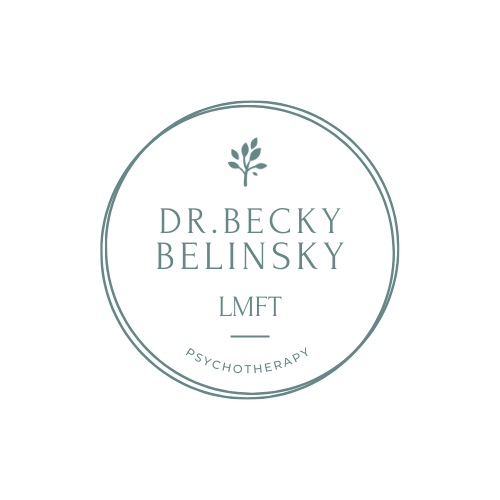FAQ about Eating Disorders, Anxiety, and Perfectionism
Interview with Becky Belinsky, LMFT
What guiding principles inform your work?
One of the guiding principles that informs my work is that everyone is unique and knows themselves best. I have a lot of training and experience about what kinds of things are helpful and healing, but, at the end of the day, I respect whatever my client feels and believes is best for them.
This allows me to approach my work with genuine curiosity and empathy and allows me to explore with my client collaboratively instead of thinking that I have all the answers.
Can you tell us more about your specialty in eating disorders?
Clients who come to me struggling with eating disorders have often been trying to manage on their own for a long time. Often clients developed an eating disorder during challenging times in life as a way to cope, and when they come to me they realize that this way of coping is no longer helping them and just causing more stress in their lives.
I work with clients on both the practical and deeper issues surrounding eating disorders. We explore what may have led them to develop the disorder, their background and history, as well as the patterns that keep them stuck. I also help clients develop ways they can change their behaviors and thoughts around food and their body so they can live a life of peace and freedom around food.
Can you tell us more about your specialty in anxiety?
Anxiety affects so many people to varying degrees. Some clients are really debilitated by their anxiety. Others seem to function fine, but it feels like a constant low-level voice that follows them everywhere. I work with people who experience anxiety in all different ways and support people in finding better ways to cope with anxiety, utilizing tools, such as mindfulness, to manage and tolerate difficult emotions. I also help people understand the ways in which anxiety helps them so they can have more self-compassion.
Can you tell us about your work with clients struggling with perfectionism?
Perfectionism isn't exactly a diagnosis, but it's a theme I see in so many of my clients. Perfectionism is particularly challenging because our world often rewards perfectionistic qualities, such as being high achieving and hard working.
These qualities aren't inherently a bad thing, but they become harmful to people when their self-worth is tied up in their achievement and doing things "right." People who struggle with perfectionism tend to have a very strong and loud inner critic, and I work with clients to recognize this critic, practice self-compassion, and acknowledge that we are all human and doing our best.
What do you find most rewarding about your work?
I love the long-term process of building a relationship with a client and seeing them grow over time. Usually there isn't a quick fix or an "aha!" moment, so I love being able to reflect with clients and look back on all the hard work they've done when they start to see it pay off. I genuinely care about all my clients and look forward to connecting with them each week. Even when sessions are challenging or emotional, I walk away feeling fulfilled because I value the relationship and the connection.
